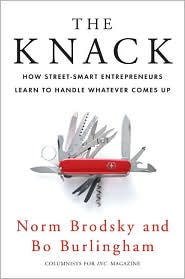
The advice Norm provides is practical, commonsense, and useful. The chapters are short and to the point, very easy to read, and filled with examples from Norm's startup experience.
One point that may be controversial is the authors' advice to put salespeople on salary plus bonus (instead of commission).
I was particularly inspired by Norm Brodsky's Bottom Line tips, four takeaway points that end each chapter of The Knack
Chapter One: How to Succeed in Business
- Point One: Don't let your emotions lead you into hasty decisions that will make it more difficult for you to achieve your real goals.
- Point Two: Make Sure you understand what cash flow is and figure out in advance where it's going to come from.
- Point Three: Control the sales mentality and balance it with a business mentality before it's too late.
- Point Four: Learn to anticipate and recognize the changes in your business by developing a good feel for the numbers.
- Point One: Those who persevere win. Be resilient and welcome failure. That's how you become a better businessperson.
- Point Two: You learn by refusing to make excuses and looking deep inside yourself for the reasons things have gone wrong.
- Point Three: Focus and discipline are more important than identifying opportunities, b ut they ahve to be balanced with flexibility.
- Point Four: The solutions are seldom right in front of you. You need to learn how to spot them out of the corner of your eye.
- Point One: It's good to have a lot of competitors because educating a market is a very expensive proposition.
- Point Two: If you're a first-time entrepreneur, it's generally better to start a business than to buy one.
- Point Three: The first business plan should be simple, and you should write it for yourself, not for potential investors.
- Point Four: Your time is more valuable than money, and you should be careful not to waste it.
- Point One: Before you ask people for money, make sure you know how much they'd like to invest and what they're looking for.
- Point Two: Start early to build a relationship with a commercial banker and use an asset-based lender only if you can't get the money you need from a commercial bank.
- Point Three: Bankers are business people, too. Treat them the way you would like your customers to treat you.
- Point Four: Your receivables are loans to your customers. Make sure your portfolio is in good shape.
- Point One: Whenever you launch a new business, keep track of your monthly sales and gross margins by hand until you have a good feel for them.
- Point Two: Find the key number that tells you how your business is doing in real time, before you get the sales report.
- Point Three: More sales usually mean less cash flow. Figure out your future cash needs while you still have time to address them.
- Point Four: Understand EBITDA [your earnings before interest, taxes, drpreciation, and amortization], and use a multiple of that -- not sales -- as the measure of your business's value.
- Point One: Listening is the most important part of any negotiation. Make sure you hear what is really being said.
- Point Two: Go in with no preconceptions, and always assume that the other side is smarter than you.
- Point Three: Develop the habit of questioning what you see on the surface and digging to find out what's really going on.
- Point Four: In an adversarial negotiation, the best deal is the one that leaves both sides a little unhappy.
- Point One: The secret of successful selling lies in losing your fear of asking. You don't ask, you don't get.
- Point Two: You probably won't discover your company's niche until after you've launched the business.
- Point Three: No niche lasts forever. You may have to discover new ones as you go along.
- Point Four: Your reputation is your most valuable business asset, and you competitors play a critical role in shaping it.
- Point One: You're better off with a base of many small customers than with a few large ones.
- Point Two: Showing is more effective than telling when it comes to signing up new customers. Let them experience what you have to offer.
- Point Three: Listening is a lost art. You can gain a competitive advantage just by listening carefully to what your prospects and customers are saying.
- Point Four: It is almost always a bad idea to reduce your prices just to fill unused capacity. You will just undermine the more profitable part of your business.
- Point One: Customer retention is the key to growth, and you retain customers by building strong relationships with them.
- Point Two: One way to build relationships with customers is to help them become smarter buyers by teaching them your business.
- Point Three: Make a point of treating old customers like new prospects. Otherwise, it's easy to start taking them for granted.
- Point Four: You will lost contact with your customers as your company grows unless you build customer face-time into your schedule.
- Point One: Customers don't like feeling that they're supporting your lavish lifestyle. Don't give them reasons to think they are.
- Point Two: Make a habit of having small price increases on a regular basis so that you aren't forced to have a big increase later on.
- Point Three: Your company is probably your most valuable personal asset. Don't undermine its value by letting your margins erode.
- Point Four: Beware of the rules you make. They may inadvertently force your employees to provide poor service to customers.
- Point One: Business is a means to an end. Do a life plan before you make your business plan.
- Point Two: When trying to move to the next level of sales, don't assume you know all the factors that led to your initial success.
- Point Three: Growing a business is a matter of choice. Before deciding to grow, make sure you know why you're doing it.
- Point Four: Bigger is not always better. Small companies have some advantages that large companies can't match.
- Point One: As close as you may be to your employees, neither you nor they should forget that it's a business relationship and needs to be treated as such.
- Point Two: If you, like most entrepreneurs, prefer selling to managing, remember that you can hire other people to do management. You don't have to do it yourself.
- Point Three: The way to deal with employee theft is to improve your systems, not to stop trusting people.
- Point Four: When the time comes for you to step aside and turn day-to-day operations over to your managers, get someone you trust to help you with the transition, and find other ways that you can contribute to the business.
- Point One: Your company's culture can be your most powerful tool for finding and keeping great employees. Don't miss the opportunities to shape it that arise every day.
- Point Two: The one thing you can't delegate is the responsibility for making sure the company has a single culture, not several competing ones.
- Point Three: Expenses have a natural tendency to creep up over time. If you want to control them, you need to get everyone involved in the effort.
- Point Four: Look for opportunities to send the message to employees that you really care about them, and that you want them to care about keeping costs down.
- Point One: Salespeople are your representatives in the marketplace. Make sure you choose salespeople who will represent you well.
- Point Two: Beware of hotshots and would-be entrepreneurs, and don't hire salespeople from within your industry.
- Point Three: Sales commissions cause a division in a company and get in the way of building a team. Don't pay on commission unless you have to, and switch to salary plus bonus a soon as you can.
- Point Four: All your employees have an impact on sales, at least indirectly. With the right training, you can teach them how to have a direct impact.
- Point One: When you're struggling with a problem, get an outside perspective to make sure you've identified the real one and come up with a solution that's going to address it.
- Point Two: Accountants are good for explaining what has happened in the past, but don't go to them for business advice. Talk to an experienced business owner instead.
- Point Three: Your lawyer's job is to tell you the potential legal consequences of a decision or a course of action -- not to give you business advice.
- Point Four: Yes, your small company can afford to hire world-class executives as long as you're willing to create a situation in which they can make money and have fun.
- Point One: There are great business lessons to be learned wherever you go, but you have to remember to look for them.
- Point Two: Solving a problem is a two-step process. First, you should stop the bleeding, and then you need to address the underlying cause.
- Point Three: Preparation is a crucial competitive edge. Don't assume you know what's in a contract -- even an old contract -- unless you've gone back and reread it.
- Point Four: The harder someone pushes you to make a quick decision, the more insistent you should be about taking your time.
- Point One: Be prepared to carry new salespeople for up to a year before getting the kind of production that will justify what it costs to hire them.
- Point Two: If you want salespeople to make good sales, teach them how your business makes money.
- Point Three: Watch your numbers carefully, and --when they change -- find out why. There's always a reason.
- Point Four: Enthusiasm is the lifeblood of a business. Be generous with it.



